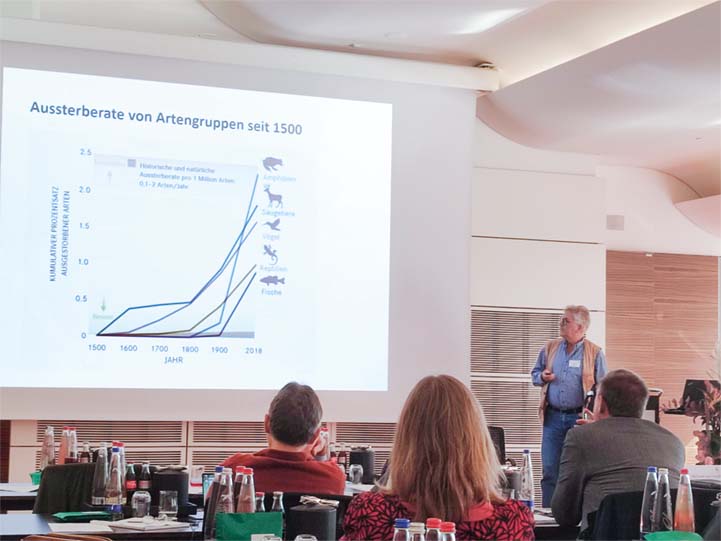IESP e. V. An International Expert Network
Functional Earth system services through resilient, diverse ecosystems
Since 2020, a series of global crisis has been exposing numerous shortcomings in the international society and the global economy. This visible systemic vulnerability underlined once more the human dependency on healthy planetary systems. IESP strongly believes that not to learn from a crisis is not to understand the crisis. At present, the experienced involuntary return to basic human needs shapes our perspectives towards the future. To maintain functional Earth systems and provide for healthy living spaces for human and non-human species, resilient ecosystems lie at the core. Their resilience grounds in diversity; ranging from cohabitating flora and fauna to landscape use and geo-engineering.

The SARS-CoV-1 pandemic, which can be viewed as a symptom of over-consumption and unsustainable economic activity [1] as well as biodiversity loss and declining natural habitats, offers us an opportunity to rethink and reset. How can we utilize the pandemic experiences to increase dynamics in realizing the 17 UN Sustainable Development Goals (SDGs), or better yet ensure that we achieve them?
In October 2021, IESP discussed these and related questions with a group of 26 experts from society, science, and politics in a three-day workshop. A jointly developed memorandum consists of six petitions we consider essential steps to leave posterity a world worth living in. The paper [2] highlights necessary transformations in agricultural land use, food trade, and institutional organization.
Among the discussants were the Russian physicists Dr. Anastassia Makarieva, a newly appointed Anna Boyksen Fellow at the TUM-IAS (Host: Prof. Anja Rammig), and her colleague Dr. Andrei Nefiodv, a visiting scholar invited by IESP to establish new trans-national research connections. They are affiliated with the Russian Academy of Sciences, and their research focuses on water balance and moisture transport in boreal forest ecosystems. Weather extremes, water shortages, and consequential vulnerability to pests and diseases stress their natural health. Forested landscapes provide “sustainable biospheric processes” that are critical for human life on Earth.
A functional landscape water regime is among the most important ecosystem services (ESS) humans depend on. For example, looking at the reach of hydrological and ecological problems in the main river basins in the western United States, which supply California and its agriculture, exposes the challenges for water supply in the Anthropocene. The current discussions on transforming the global agricultural and food systems neglect the importance of a healthy landscape water balance. Yet it is a prerequisite for vital conditions including biodiversity, plant health, and soil fertility. The impacts of climate change through unsustainable farming and building practices are also measurable in Bavaria, raising issues of distributional fairness and conflicts of use.

To raise more attention for the need to rewrite our water future, and to plant seeds for innovative ideas and collaborations, IESP hosted two digital workshops during the winter of 2020 / 2021. The first event served as a kick-off event for an expert commission on Bavaria’s future water supply. Its mission was to serve as an independent scientific body to assess the current state of the various water supply systems and to suggest measures to strengthen their resilience, given the increasing impacts of climate change. The second workshop discussed preliminary results and questions with different stakeholders. The commission’s report to the State Ministry for the Environment and Consumer Protection outlines measures that are crucial to improve and stabilize regional landscape water regimes while maintaining the local cultural landscape and mitigating conflicts of interest [3].
Such conflicts arise not only between nature and humans, but also at the intersections between interests such as the supply of drinking water, agriculture, and food production. Here, as in other sectors, COVID-19 exposed archaic work structures and was blamed, by parties deliberately diverting attention from existing structural deficits and missed opportunities, for long-standing crises. In the midst of this process, a German legal requirement for entrepreneurial care along global supply chains (LkSG) was passed and came into force. IESP’s 2022 summer workshop aims to illuminate the effects of this new law for agriculture and the agricultural sector’s transformation toward greater sustainability.
Sustainability is the core concept of IESP’s framework of thought on maintaining a healthy Earth system. Its variety of applications features in an edited volume following a joint workshop IESP organized with the TUM Emeriti of Excellence at the TUM Academy and Science Center in Raitenhaslach. Strategies for Sustainability of the Earth System, edited by Peter A. Wilderer, Michael Molls, Martin Grambow, and Konrad Oexle, is published with Springer Nature.
IESP’s current project “Landwirtschaft-Wasserwirtschaft-Klimawandel. Neue Perspektiven für Landwirtschaft und Umwelt” (2018 – 2023) is funded by the Bavarian State Ministry of the Environment and Consumer Protection.
[1]
European Environment Agency (ed.). COVID-19 and Europe’s environment: impacts of a global pandemic. Briefing no. 13 / 2020.
[2]
IESP (International Expert Group on Earth System Preservation). Sustainability Post-Corona. Stronger commitment and responsible dynamics are needed! (2021) [Memorandum]; mediatum.ub.tum.de/doc/1639556/1639556.pdf.
[3]
Drewes, J. E. et al. LAND: schaf(f)t: WASSER. Bericht der Expertenkommission Wasserversorgung in Bayern (2021).